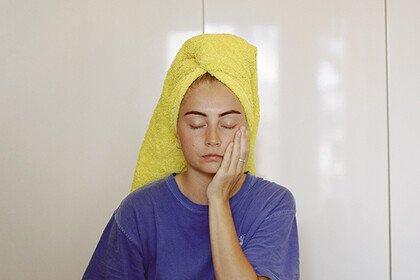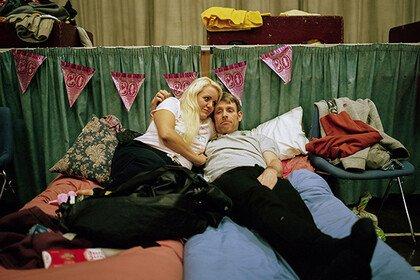
The Covid-19 Anxiety Project
Wellcome commissioned five photographers from five different countries to tell their stories, answering the question: How are you, your family and your friends coping with anxiety related to Covid-19?
The winner of the Wellcome Photography Prize 2020, and winner of the Mental Health (series) category, is Arseniy Neskhodimov with his 'Prozac' series. This set of self-portraits fuses raw emotion with a keen sense of the absurd, chronicling his efforts to escape his depression.
Sign up for emails to get the latest news about the Wellcome Photography Prize, including when the 2022 prize will be opening.
The other category winners capture the way an 11-year-old with a brain tumour delights in life, the social reality of female genital mutilation in Nigeria, a baby whose mother is learning physiotherapy to help with a birth defect, and a father whose daughter supports his mental health.
The 2020 prize had five categories: Social Perspectives, Hidden Worlds, Medicine in Focus, and two categories on Mental Health, which was the special theme for this year.
Mental health is difficult to depict and, often, hard to explain, which leads to misunderstanding and stigma. The shortlisted photographers have, in no small feat, managed to convey both the interiority of their subjects and the stigmas around various mental health issues, asking us to look more closely and think more openly.
The winning images in the Wellcome Photography Prize 2020 are the pick of thousands of entries, from 127 countries, chosen by a diverse panel of judges.
The winner of each category received £1,250, with the overall winner receiving a prize of £15,000.
These photographs explore how health – good and bad – affects society.
The winner is Marijn Fidder, a Dutch documentary photographer who focuses on social issues. She has a particular interest in photographing children with cancer, producing positive but honest albums for them and their families. She also works freelance for national newspapers and NGOs.
Browse all shortlisted entries in this category.
Click images to open gallery
These photographs expose health unseen: the taboos we shy away from, the places we rarely visit, or the uncharted conditions we don’t yet understand.
The winner is Jenevieve Aken, a Nigerian photographer and storyteller who focuses on social documentary photography. She explores personal experiences and contemporary social issues of identity, sexuality, gender and social roles.
Browse all shortlisted entries in this category.
Click images to open gallery
These photographs show healthcare and medicine up close and personal.
The winner is Julia Gunther, a German photo artist and documentary photographer. She explores themes of representation, women’s heath, gender, visual identity and social activism. Her work has featured in publications like the New York Times Magazine, TIME, The Independent, NPR, Marie Claire, Dazed and WIRED. For this photograph, Julia collaborated with Sophia Mohammed, Light for the World.
Browse all shortlisted entries in this category.
Click images to open gallery
These photographs fight the clichés and stigmas of mental illness through personal stories.
The winner is Benji Reid, a British artist with a background in physical theatre who has worked with companies like David Glass Ensemble and Black Mime Theatre Company. Six years ago, he switched to photography, and his work has been shown at MoCADA in Brooklyn, Somerset House in London and Design Fair Paris.
Browse all shortlisted entries in this category.
Click images to open gallery
These sets of photographs tell more expansive stories, with narratives exploring the ways that individuals or groups live with their own mental health problems and how they seek solutions.
The winner of this category – and the Wellcome Photography Prize 2020 winner – is Arseniy Neskhodimov, a Russian artist who creates conceptual visual projects about his identity, incorporating photographed or filmed performances. His work touches on issues of disillusionment and alienation as experienced by those of his generation, born in the early 1980s.
Since he was 20, Arseniy Neskhodimov has been prone to depression. Finding antidepressants unhelpful, he decided to get out of Moscow and find somewhere he could be happier, chronicling his own experiences. But the depression followed him.
People imagine that depression is like ordinary unhappiness, only more so. It isn’t. And the things we typically do to cheer ourselves up can’t be relied on as treatments. Neskhodimov tried a change of scene to get away from his troubles, but to no avail. He now thinks depression has to be understood and treated as an illness, although he isn’t sure how.
Click images to open gallery
Fritz Dressler (1937–2020) was a landscape and architectural photographer who suffered from Alzheimer’s disease during the last years of his life. He was an intense, creative, headstrong man whose identity resisted the illness; his soul and emotional state shine out from these portraits.
The cognitive effects of dementia are well-known, like loss of memory, language skills and concentration, but the emotional experience of the disease has a huge impact on mood as well. While scientists have yet to find a cure, there are already drugs that can combat the symptoms. And familiar places, people and activities can provide enormous comfort, helping people like Fritz to remain themselves for longer.
Click images to open gallery
This neighbourhood on the bank of the Lagos lagoon suffers annual flooding – more severely and for longer, as climate change raises sea levels. Apart from the physical damage and the risk of water-borne diseases, there comes a threat to mental health. How can you live your life in a massive puddle of water? What would that kind of stress do to you?
Living through a natural disaster – or one fuelled by human activity – is traumatic. Floods, droughts and extreme weather can destroy your assumptions about the safety of your home. Even if the initial shock passes, you then face an uncertain daily existence, where fear of what might happen next mingles with a terrible sense of loss. Climate change is a threat to mental health just as it is to physical health, and governments’ responses to it must take that into account.
Click images to open gallery
Therese Alice Sanne invited young people with mental health problems to draw or paint on portraits she had taken of them, to give them a chance to portray themselves as they really feel.
Mental illness is often not apparent to an onlooker. People struggling with their mental health can find it impossible to make themselves and their pain understood to those around them, and this chasm between outer world and inner reality can compound their suffering. Finding creative ways to express these feelings may be therapeutic, and might even help to bridge the communicative gap.
Click images to open gallery
If it’s hard to get treatment for your mental health problems, you might have to improvise. You may be able to take care of yourself a little by putting together a kit of things that help you get through difficult moments. Sebastian Mar has photographed Russian women along with the mental health first-aid kits they have created.
Good mental healthcare can be hard to get in Russia – partly a legacy of the Soviet approach of suppressing ‘volatile’ people rather than helping them. And women are particularly at risk of conditions like eating disorders, PTSD and depression, partly because of high levels of violence against women. They try to cope: each of these kits is a manifestation of hope and resourcefulness. But if their problems are understood more widely, perhaps it will become easier to access professional treatment.
Click images to open gallery
This year we have two commissions which explore the theme of mental health: the collaborative Covid-19 Anxiety Project, and a project from award-winning photographer Siân Davey.

Wellcome commissioned five photographers from five different countries to tell their stories, answering the question: How are you, your family and your friends coping with anxiety related to Covid-19?

Testament, by Siân Davey, intimately examines the impact of poverty on mental health, loneliness and community ties.
If you would like to know more about the prize
For media enquiries